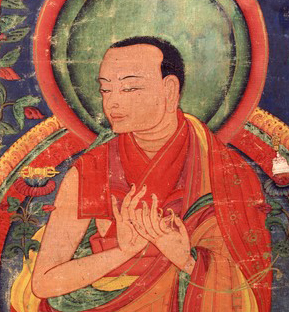No edit summary |
No edit summary |
||
| Line 7: | Line 7: | ||
|blogContent=It is quite interesting that two Sakya lamas, [[People/%27gro_mgon_chos_rgyal_%27phags_pa|Chögyal Phakpa]] (1235–80) and [[People/Bsod_nams_rgyal_mtshan|Lama Dampa Sonam Gyaltsen]] (1312–75), almost a century apart, wrote two texts which bear almost identical titles. The first one, [[Texts/Theg_pa_chen_po_rgyud_bla_ma%27i_bstan_bcos_kyi_bsdus_pa%27i_don|''Synopsis of the Mahāyāna Treatise the Ultimate Continuum'']] (ཐེག་པ་ཆེན་པོ་རྒྱུད་བླ་མའི་བསྟན་བཅོས་ཀྱི་བསྡུས་དོན།) was written by [[People/%27gro_mgon_chos_rgyal_%27phags_pa|Chögyal Phakpa]] in China in the Palace of Kubilai Khan, whom he describes as a bodhisattva. The second is a synopsis by [[People/Bsod_nams_rgyal_mtshan|Lama Dampa Sonam Gyaltsen]], who is best known for his history of Tibet called the ''Clear Mirror'', and is entitled [[Texts/Theg_pa_chen_po_rgyud_bla_ma%27i_bsdus_pa%27i_don|''Synopsis of the Ultimate Continuum of Mahāyāna'']] (ཐེག་པ་ཆེན་པོ་རྒྱུད་བླ་མའི་བསྡུས་དོན།). | |blogContent=It is quite interesting that two Sakya lamas, [[People/%27gro_mgon_chos_rgyal_%27phags_pa|Chögyal Phakpa]] (1235–80) and [[People/Bsod_nams_rgyal_mtshan|Lama Dampa Sonam Gyaltsen]] (1312–75), almost a century apart, wrote two texts which bear almost identical titles. The first one, [[Texts/Theg_pa_chen_po_rgyud_bla_ma%27i_bstan_bcos_kyi_bsdus_pa%27i_don|''Synopsis of the Mahāyāna Treatise the Ultimate Continuum'']] (ཐེག་པ་ཆེན་པོ་རྒྱུད་བླ་མའི་བསྟན་བཅོས་ཀྱི་བསྡུས་དོན།) was written by [[People/%27gro_mgon_chos_rgyal_%27phags_pa|Chögyal Phakpa]] in China in the Palace of Kubilai Khan, whom he describes as a bodhisattva. The second is a synopsis by [[People/Bsod_nams_rgyal_mtshan|Lama Dampa Sonam Gyaltsen]], who is best known for his history of Tibet called the ''Clear Mirror'', and is entitled [[Texts/Theg_pa_chen_po_rgyud_bla_ma%27i_bsdus_pa%27i_don|''Synopsis of the Ultimate Continuum of Mahāyāna'']] (ཐེག་པ་ཆེན་པོ་རྒྱུད་བླ་མའི་བསྡུས་དོན།). | ||
[[File:Pakpa Lodro Gyaltsen HAR.jpg|Chögyal Phakpa]] | [[File:Pakpa Lodro Gyaltsen HAR.jpg|class=float-right rounded depth-1|Chögyal Phakpa|link=]] | ||
Although both texts have the title "synopsis" (བསྡུས་དོན་), neither of them provide synoptic exegesis of the ''Ultimate Continuum''. Instead, both the texts are outlines (ས་བཅད་) of the ''Ultimate Continuum''. The former presents the ''Ultimate Continuum'' by dividing it into two main headings, while the latter does so through four main headings. While the former is signed off by the author himself, the latter was extracted from the author's commentary on the ''Ultimate Continuum'' by one Gyaltsen Zangpo. Neither of the texts provide any special philosophical interpretation or insight into the ''Ultimate Continuum''. | Although both texts have the title "synopsis" (བསྡུས་དོན་), neither of them provide synoptic exegesis of the ''Ultimate Continuum''. Instead, both the texts are outlines (ས་བཅད་) of the ''Ultimate Continuum''. The former presents the ''Ultimate Continuum'' by dividing it into two main headings, while the latter does so through four main headings. While the former is signed off by the author himself, the latter was extracted from the author's commentary on the ''Ultimate Continuum'' by one Gyaltsen Zangpo. Neither of the texts provide any special philosophical interpretation or insight into the ''Ultimate Continuum''. | ||
}} | }} | ||
Revision as of 11:58, 21 January 2022
Two Sakya Lamas and Two Synopses
It is quite interesting that two Sakya lamas, Chögyal Phakpa (1235–80) and Lama Dampa Sonam Gyaltsen (1312–75), almost a century apart, wrote two texts which bear almost identical titles. The first one, Synopsis of the Mahāyāna Treatise the Ultimate Continuum (ཐེག་པ་ཆེན་པོ་རྒྱུད་བླ་མའི་བསྟན་བཅོས་ཀྱི་བསྡུས་དོན།) was written by Chögyal Phakpa in China in the Palace of Kubilai Khan, whom he describes as a bodhisattva. The second is a synopsis by Lama Dampa Sonam Gyaltsen, who is best known for his history of Tibet called the Clear Mirror, and is entitled Synopsis of the Ultimate Continuum of Mahāyāna (ཐེག་པ་ཆེན་པོ་རྒྱུད་བླ་མའི་བསྡུས་དོན།).
Although both texts have the title "synopsis" (བསྡུས་དོན་), neither of them provide synoptic exegesis of the Ultimate Continuum. Instead, both the texts are outlines (ས་བཅད་) of the Ultimate Continuum. The former presents the Ultimate Continuum by dividing it into two main headings, while the latter does so through four main headings. While the former is signed off by the author himself, the latter was extracted from the author's commentary on the Ultimate Continuum by one Gyaltsen Zangpo. Neither of the texts provide any special philosophical interpretation or insight into the Ultimate Continuum.
Weekly quote
~

